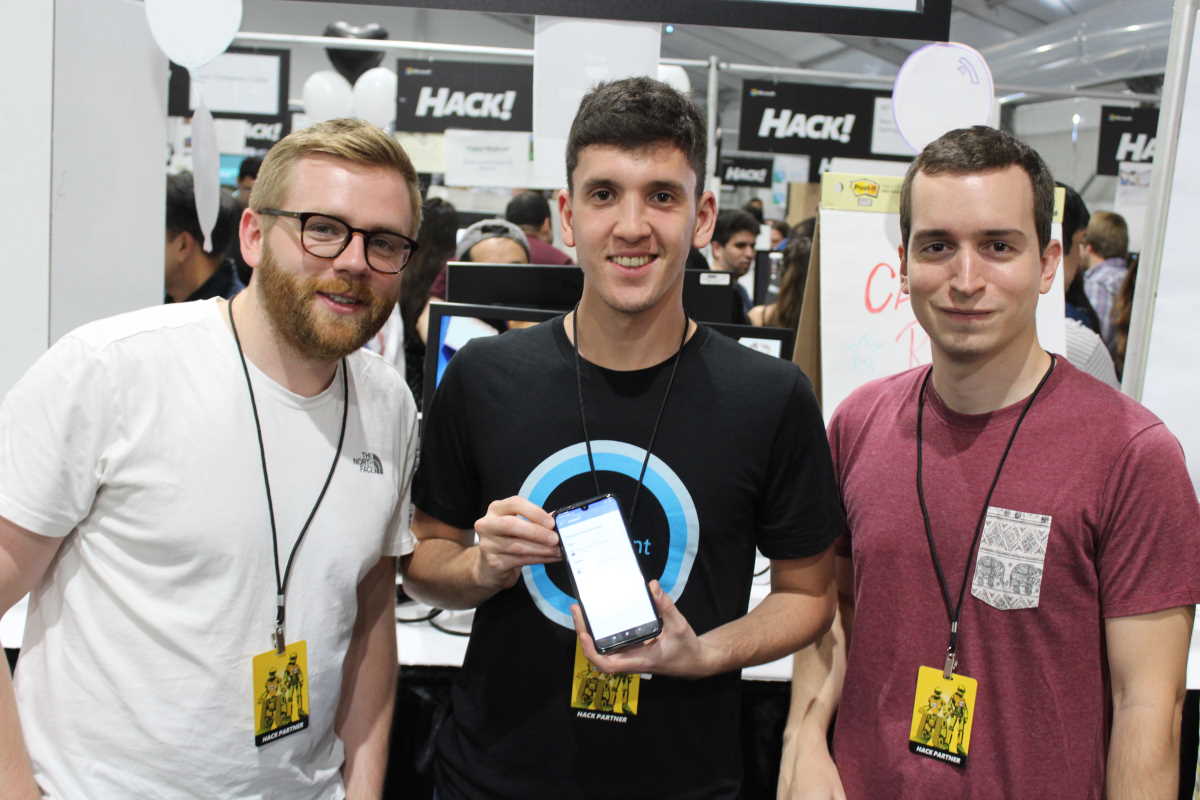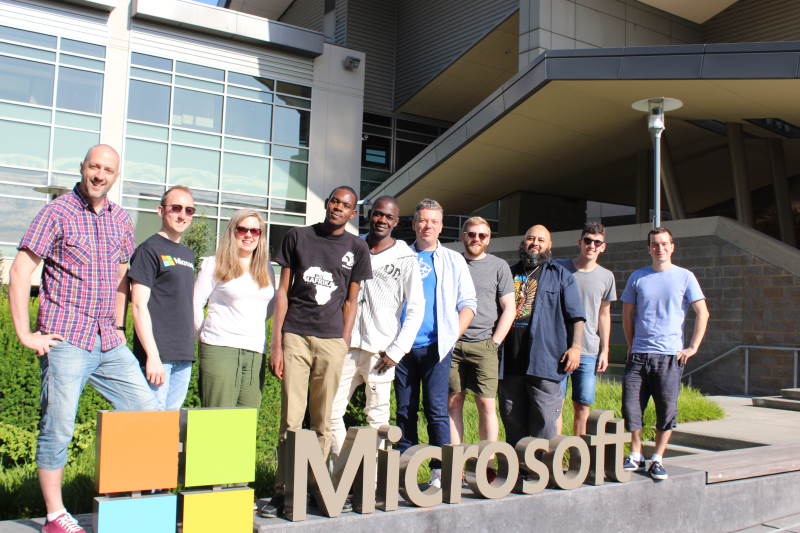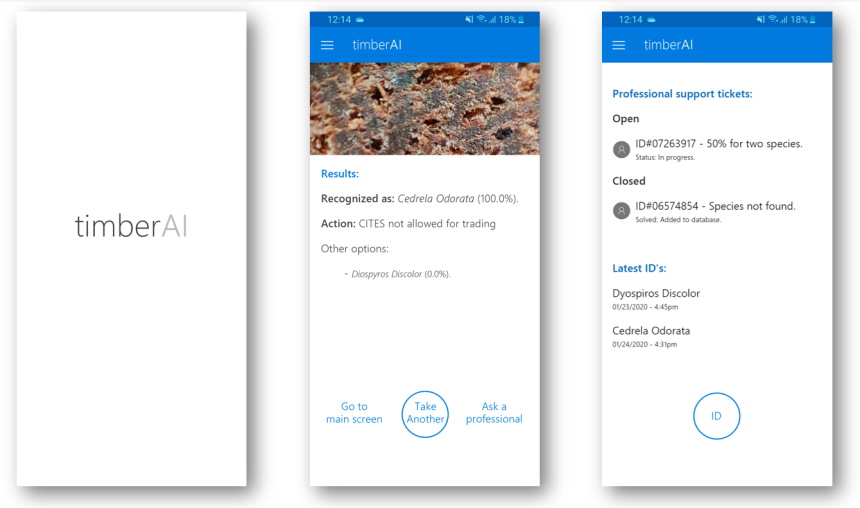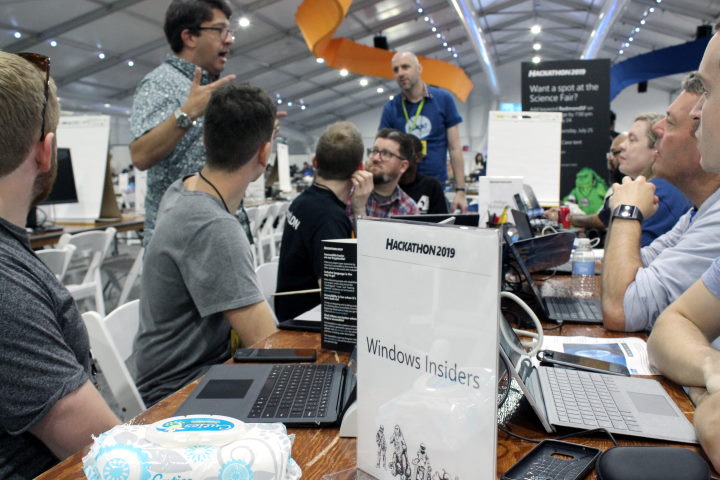What do a forester, a developer, and a software architect have in common? A passion for problem-solving and, as it turns out, stopping illegal timber trade. Antonio de Marco, James Mundy, and Mauro Petrini came together from different corners of the world to participate in the 2019 Microsoft Hackathon. Their objective was protecting biodiversity through sustainable forestry by solving one piece of the complex puzzle: the real-time identification of imported or exported timber species, verified against an endangered species database using a mobile app. As we look forward to an all new virtual experience for Hackathon 2020 this summer, we are spotlighting this team’s achievements and the spirit of Windows Insiders at Hackathon.
Imagine a customs officer inspecting shipments of timber where, in some cases, the wood origin is not clearly noted on the accompanying documentation. TimberAI, the project which Antonio, James, and Mauro collaborated on would help the custom’s officer identify if the species is endangered or commercial with the snap of a photo using Microsoft Cognitive Services and Azure. The app can reduce instances of illegal timber being traded but also protect critical forests and habitats as a tool for officials to enforce more sustainable, legal logging.
 TimberAI team at Hackathon 2019 – James Mundy, Mauro Petrini, Antonio de Marco. Photo Credit: Windows Insider Program
TimberAI team at Hackathon 2019 – James Mundy, Mauro Petrini, Antonio de Marco. Photo Credit: Windows Insider Program
Windows Insiders bring fresh perspectives to Hackathon
The three team members shared something else in common—all are Windows Insiders. Spanning the globe with millions of participants, the Windows Insider Program is a free program that enlists the help of consumers to improve Windows. One of the largest fan programs at Microsoft, Insiders can choose when and which Windows 10 Insider Preview Builds they would like to install on their devices, and after trying it out, provide valuable feedback directly to Windows engineers.
Another benefit of becoming a Windows Insider is the opportunity to win exclusive experiences to Microsoft events like Microsoft Build or, in this case, the company’s global Hackathon produced by the Microsoft Garage.
After reviewing hundreds of submissions to the Windows Insiders Hack at Microsoft contest, ten Insiders were chosen to come to Redmond to participate in the 2019 Hackathon last July. “We try to align our offerings with what our Insiders tell us they value most, like talking to the teams that build the products they love and early access to the latest technology,” said Michelle Paison, a program manager who oversees the contests and giveaways for WIP. “It’s definitely a cool experience, getting to be on the inside of what’s traditionally an internal event and work on hackathon projects with Microsoft employees.”
 Windows Insiders who participated in Hackathon 2019: Stefan Malter, Mark Lunney, Michelle Spaul, Josh Cardif, Clint-Roy Mukarakate, Dr. Robert de Graaft, James Mundy, Dan Flores, Mauro Petrini, Antonio de Marco. Photo Credit: Windows Insider Program
Windows Insiders who participated in Hackathon 2019: Stefan Malter, Mark Lunney, Michelle Spaul, Josh Cardif, Clint-Roy Mukarakate, Dr. Robert de Graaft, James Mundy, Dan Flores, Mauro Petrini, Antonio de Marco. Photo Credit: Windows Insider Program
A large part of what makes a hackathon project successful is having teammates who are willing to solve problems in new ways. Insiders expressed an openness to collaborate with other talented individuals, and most contest entrants had an entrepreneurial spirit, taking initiative in their job or for a cause they were passionate about. Insiders brought a wide range of skills and represented global perspectives from countries like Kenya, Argentina, and Germany.
Meet the team and the TimberAI potential on a global scale
“It was nice to put my skills to good use to create a solution that might, in the future, make a discernable difference towards preserving trees — one of our best weapons against rising CO2 levels,” said James. “I was struck by the idea and the unique product we could build, and also how feasible it was that we could lean on Azure Cognitive Services and Antonio’s image library to build a prototype in just a few days.” The team created a working prototype using Xamarin to build the mobile app front-end with Microsoft Cognitive Services to recognize and classify wood image samples.
James is a Freelance Software Developer and Product Builder based in London. Teammate Mauro works as a Software Architect for a financial company in Argentina. In addition to his day job, Mauro volunteers with a nonprofit that makes prosthetic hands.
Leading the project is Antonio, who brought the concept behind TimberAI to the Hackathon and project manages the app development. Antonio is a forestry engineer currently collaborating with the Wood and Science Technology Laboratory from the Forest and Natural Environment Engineering School at the Technical University of Madrid. The idea for an app started in the Wood and Science Technology Lab with Antonio and Professor Luis García Esteban, who is also the TimberAI project Resource Manager.
“Illegal timber trading is one of the biggest factors leading to the loss of global biodiversity. With more sustainable legal logging, we would have greater biodiversity and greater forest cover, which helps remove carbon dioxide from the atmosphere and reduce the impact of climate change.” – Antonio de Marco
Antonio explained, “This project acts as a straight knowledge-tunnel between some of the most renowned wood technology investigators and the daily users at customs, who need powerful but simple tools to work with. Illegal timber trading is one of the biggest factors leading to the loss of global biodiversity. With more sustainable legal logging, we would have greater biodiversity and greater forest cover, which helps remove carbon dioxide from the atmosphere and reduce the impact of climate change.”
According to Antonio, the world cuts around 4,000 million cubic meters of wood annually, which is roughly the equivalent of cutting about 30 soccer fields per minute for a year. It’s estimated that about 10-30 percent of all the wood is illegally logged. “We are losing species at an extinction rate not known in the geological record of the Earth,” said Antonio. Like others, he is driven to do what he can with the tools and resources he has to create a more sustainable future with the biodiversity that’s crucial in a thriving, healthy ecosystem.
Because of its geographical location, Spain is a hub of international commerce with large amounts of items, including timber, being funneled through its ports and redistributed to Europe, Asia, and even America. “This is why Spain must play a very important role in order to put a first barrier to the illegal traffic of those species of wood,” said Antonio. Outside of his work with the university, Antonio also runs a startup that improves air quality of indoor spaces. His expertise in forestry helped the team of three achieve a working prototype.
 Screenshots of the TimberAI MVP. Photo Credit: Antonio de Marco
Screenshots of the TimberAI MVP. Photo Credit: Antonio de Marco
Winning the Sustainability Challenge
“Besides getting to work with two fantastic people, James and Mauro, the biggest takeaway for me was being able to link my forestry engineer profession to my techie passion. There is nothing better than enjoying yourself while working on something that could possibly have a positive impact on a lot of people,” said Antonio.
Each year for Hackathon, there are challenges issued by executive leadership focused on areas important to their business which teams can choose to hack on. After the Hackathon finished, Antonio, James, and Mauro received news their project was selected as the top project in the Sustainability Challenge. The company has long been a proponent of sustainability, but the 2019 Hackathon marked the first year a Sustainability Challenge was issued by Microsoft President and Chief Legal Officer, Brad Smith, with a goal to fuel innovation and accelerate environmental sustainability across the company and around the globe.
“What they were able to accomplish is truly remarkable and a testament to their intelligence and innovation,” said Michelle. “There are just so many good ideas that exist within the Windows Insider community, with the improvements they suggest for Windows 10 daily, and that extends into different issues outside as well.”
AI for Earth and the path forward
While unrelated to the Hackathon, Antonio and Luis were also awarded an AI for Earth grant for the work they’ve continued to do at the Technical University of Madrid and working with the government of Spain.
“Customs agents have to make quick decisions about thousands of shipments every day, and it’s not feasible for them to be experts in every material they have to inspect. AI systems like TimberAI offload that niche, ever-changing expertise to technology,” said Dan Morris, Program Director for the Microsoft AI for Earth Program.
Antonio was also invited to speak at an AI for Earth Innovation workshop in Spain as part of a team of mentors. “He shared his overall experience with Microsoft in such a positive light and served as inspiration to the rest of our participants,” said Alma Cardenas, AI for Earth Senior Program Manager who attended the workshop.
In the time since Hackathon, Antonio and the team at the Wood and Science Technology Lab have been standardizing the process of wood species identification using macroscopic photographs from smartphones, creating a more robust library of species TimberAI can identify based on the CITES species guide.
“We were able to showcase our working prototype at the United Nations Climate Change Conference, so it’s been getting a lot of positive reception from other national entities,” said Antonio. “It was a pleasure getting involved in the Microsoft Hackathon. I have been part of other local hackathons, but this one was something special. Being on the same team as James and Mauro to get the first MVP of TimberAI working was possible thanks to this experience.”
 Windows Insiders getting ready to hack at Hackathon 2019. Photo Credit: Windows Insider Program
Windows Insiders getting ready to hack at Hackathon 2019. Photo Credit: Windows Insider Program
A prime example of how hackathons can take ideas to the next level, from concept to prototype, embracing new challenges and different perspectives to form solutions, collaborating with the same goal in mind – sparked by a passion for positive impact on our shared planet.
